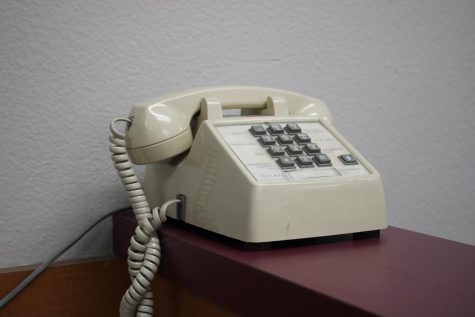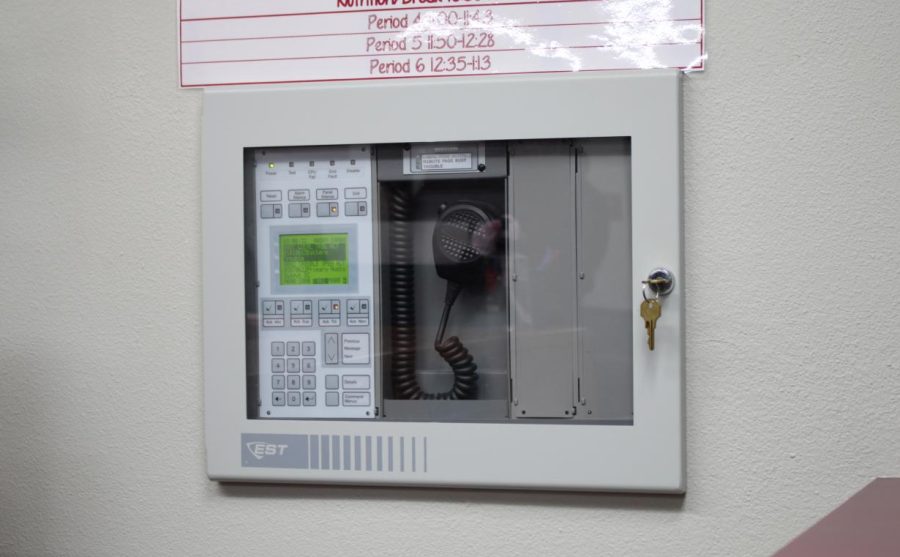Excessive false fire alarms concern students and staff
Across Principal Dr. Charles Park’s office, the working fire alarm control panel remains easily accessible in case of an emergency.
March 13, 2023
In the course of this school year, false fire alarms have disturbed classes across campus an average of once a month. Unexpected blasting sirens drown the hallways and classrooms, distracting everyone from their tasks. Instead of acting as a signal to evacuate the buildings, fire alarms now represent continuing classwork and staying put. With a neglectful attitude towards the fire alarms, students question whether or not the school is prepared for a real fire emergency.
Students are not the only ones affected by interruptive false alarms, it consumes the teacher’s time as well. It is unproductive for every student and teacher to evacuate their classroom for every false alarm, so teachers are left to wait until the public address by the administration states the alarm was false.
Yadhira Frometa, a Spanish teacher, explains how false alarms impact both students and teachers.
“If I’m giving instructions or lecturing I have to stop what I’m saying because I can’t speak over the fire alarm. If students are working they tend to pause too because they have a hard time focusing when the alarm is going off,” said Frometa.
Breaking the concentration of both teacher and students disrupts the classes’ productivity and flow, taking away important moments of lessons, tests, or assignments. Although the alarms usually last from 30 seconds to one minute, the piercing noise and flashing lights are difficult to ignore when the visible and audible alarm is evident in every room.
The frequent fire alarms have created speculation among students about an unreliable fire alarm system. Whenever the fire alarm goes off classrooms no longer evacuate, with the most action carried out being a teacher or student checking if others are leaving. The lack of urgency from everyone on campus has made students concerned about the response to a genuine fire emergency.
Junior Karen Muñiz shared her initial reactions to every false fire alarm.
“My first thought is ‘again?’… our response should be urgent and should be immediate action, but because we’re so used to it, we are kind of immune to the response,” said Muñiz.
Sophomore Steven Telfair also shares how the numerous false fire alarms are affecting everyone on campus.
“It’ll convince us to think that there is no emergency the day we have an emergency,” said Telfair.
The control panel for the fire alarm system is set in the main office. Students rely on administration for accurate reports of the alarms. Without administration, students are incapable of being aware of on-campus emergencies on their own.
Every distraction on campus has a source and Principal Dr. Charles Park shared that the main reason for excessive false fire alarms is their high sensitivity. With the censors being extremely sensitive, they are able to detect any amount of smoke within their radius. Although the detectors are vulnerable to any smoke or vapor other than actual fire, they prove to be highly protective of campus. He listed smoke from grilling school lunch hamburgers, burnt microwave food, and testing fog machines all as possible situations of how the alarms are triggered. Most of these situations have an opportunity to spiral out of control, creating a larger and more dangerous fire than the start.
“There are so many multiple reasons, so it’s important we react quickly to each fire alarm, in case there’s a real fire we want to be out immediately,” Park said.

Park also described the procedure before disabling the fire alarm which involved great amounts of communication.
“When we have a fire alarm go off, what we do is have security, administration, staff, visual check of the physical building and either state its a real fire and we need to evacuate, or its a false alarm, then we go over the announcement, say its a false alarm and make sure its turned off,” said Dr. Park.
Every time a fire alarm is set off the control panel displays which building detected smoke. Then the alerted adults search the designated building efficiently to ensure there are no traces of fire. Any alert of a fire alarm being triggered notifies the West Covina Fire Department to verify any need for assistance from them. After the building and surrounding are clear, they make a public announcement on the telephone that the fire alarm is false.
Sacrificing one minute of class time allows for taking extra precautions benefiting everyone’s safety on school grounds. Students can be assured that the fire alarm system is operating thoroughly to protect everyone on campus. False fire alarms are certainly troublesome, but they indicate the alarms work properly and effectively, although sometimes too effectively.



